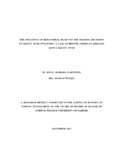| dc.description.abstract | This paper set out to study behavioral biases of investors in the equity fund market and how they apply in our local situation. The objective of this study was to identify behavioral biases and phenomena present amongst investors in the equity fund market in Kenya and determine how these behavioral biases influence their trading decisions in terms of buying and selling of equity fund scheme shares. This study sought to identify if investors’ selling behavior is influenced by the disposition effect and loss aversion and if investors are irrational in their purchasing decisions by irrationally buying shares with high prices or buying shares based on how old the fund is rather than the fund’s performance.
The study was an exploratory study. It focused on the British American equity fund scheme as it has been and it still is, the largest equity fund scheme in Kenya, with the most investors. The British American equity fund scheme has a current market share of 54%. Secondary data was collected from British American’s equity fund data base and from their publicly available financial statements for the years 2008 to 2011. The data was analyzed using statistical tools such as charts and graphs and using regression analysis.
The study found that investors exhibited both rational behavior and irrational behavior in their trading decisions. It was found that there were a number of investors who were influenced by the disposition effect and by loss aversion in their selling/redemption decisions in that they sold fund shares quickly when prices increased slightly and held on to shares slightly longer when prices declined below the original fund share price of Kshs. 100. However, there were also a number of investors who retained their shares longer when prices were on an upward trend and sold them when prices had increased even further to higher levels, hence realizing more gains on redemption. With regard to purchasing decisions, the study found that investors were mostly rational, buying shares when prices declined. The study also found that investors purchased more shares in the fund when the performance of the fund improved i.e. when the fund made increased return/profits, which is also rational. It was noted however, that the number of fund shares issued decreased as the fund got older. This is in keeping with other studies that found that there is an irrational tendency of investors to purchase more shares from newer and younger equity fund schemes. | en |

